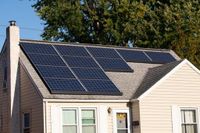As Belgium braces for a potential disruption in solar energy production due to a looming phenomenon involving a sand cloud from the Sahara, the national electricity grid manager, Elia, has issued a cautionary alert. Scheduled for Saturday, March 22, 2025, the expected arrival of this sand cloud may dim the sunshine required for solar panels to function optimally, leading to fluctuations in electricity generation.
Elia's warning comes in light of past experiences with similar meteorological conditions. On April 7, 2024, a sand cloud also passed over Belgium, changing course abruptly which resulted in an unanticipated surplus of electricity in the grid. During that incident, Elia had to go to great lengths to stabilize the energy supply, incurring costs of over 4,500 euros per megawatt-hour to manage the excess electricity effectively. This event serves as a poignant reminder of the potential volatility tied to natural weather phenomena.
"We want to ensure that we are prepared for any fluctuations in energy production this weekend," a representative from Elia emphasized. While the specific impact of the pending sand cloud remains uncertain, it could lead to veiled sunlight, thereby reducing the performance of solar panels. As such, both energy producers and large consumers of electricity are being urged to remain vigilant in the face of these possible changes.
The dynamics at play involve more than just the immediate effect on solar energy generation. The currents drawing up from the Sahara that are expected to sweep into Belgium have implications for air quality as well. These winds may bring sand along with them, which could exacerbate respiratory issues for individuals already facing breathing difficulties. Hence, there are health considerations to take into account alongside the environmental implications.
Experts acknowledge that the transport of Sahara sand to Europe is a common natural phenomenon. This process can occasionally impede solar panels' efficiency by reducing the amount of solar radiation that reaches them. While it is technically possible for solar energy production to be significantly hindered, historical data does not provide concrete evidence of this occurring on a large scale in Belgium. Nevertheless, the occurrence does highlight the interconnectedness between natural events and energy production capabilities.
"It's something we need to monitor carefully, as these natural events can have ripple effects throughout the electrical grid and public health," the Elia representative added.
Though concerns around air quality due to the Sahara sand may be unfounded for most individuals, there remains a heightened risk for vulnerable populations including those suffering from respiratory conditions. Current weather forecasts indicate that the warm winds and sands from the Sahara will sweep across Belgium, potentially creating conditions that some may find oppressive.
Despite the unsettled forecast for Saturday, Elia assures the public that the overall security of electricity supply remains intact. Their mission is to maintain an equilibrium between supply and demand, thereby preventing any significant disruption in service. The vigilance of both energy providers and consumers will be essential in navigating through potential fluctuations.
Saturday represents a critical test for Elia, with the team prepared to monitor the conditions closely while balancing the demands of the electricity network. Given the previous year's experiences, this cautionary alert isn't just about managing electricity generation; it encompasses broader concerns involving health and environmental issues.
The interplay of these factors underscores an important truth: the impacts of climate and weather can have far-reaching consequences not just for energy production, but also for public health. As the weekend approaches, all eyes will be on how these natural phenomena affect life and energy in Belgium.


